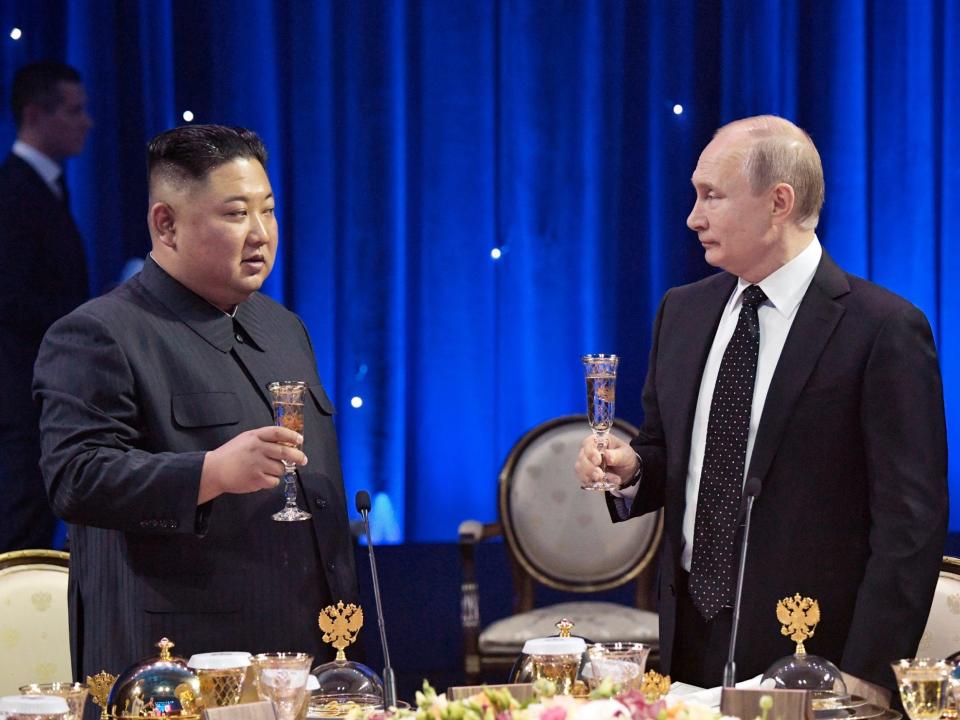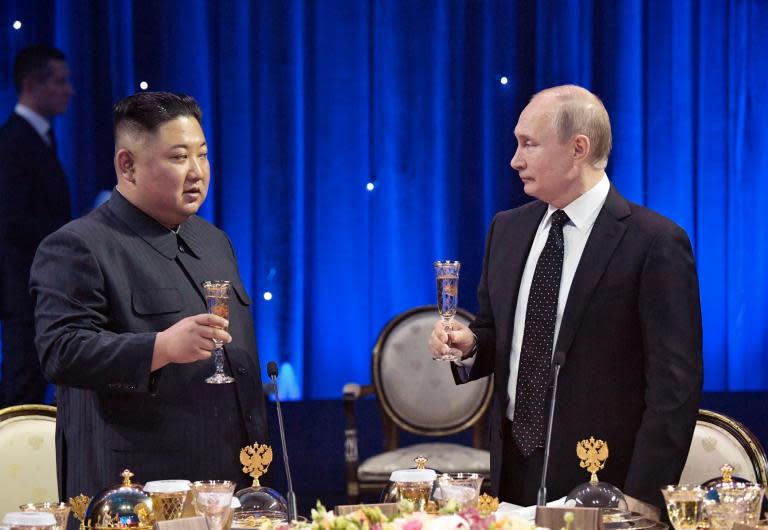Letter to America: Kim Jong-un and Vladimir Putin’s first meeting appears to send message to Donald Trump
A first-ever summit between Vladimir Putin and Kim Jong-un began with firm handshakes and ended, apparently after a few drinks, with a swashbuckling press conference from the Russian president.
In between, Mr Putin tried to present himself as an international arbiter with more than a capacity for mischief.
Mr Kim’s decision to take up a long-standing Russian invitation to visit has come during an impasse in sanctions negotiations with the US. The Korean pivot to Moscow has been widely interpreted as a signal to Washington; a gesture from Mr Kim that President Trump is not the only player in town.
At a press conference, held after several bottles of champagne were seen being wheeled into the meeting, a shiny-faced and often slurring Mr Putin was happy to emphasise the point.
“The leader of North Korea personally asked us to inform the American side of his position,” he said. “There are no secrets here.”
Following two hours of conversation – an hour over what was planned – Mr Putin declared his opposite number to be an “open … quite interesting and substantive interlocutor”.
The discussions touched on de-nuclearisation, UN sanctions, the prospect of North Korean workers being expelled from Russia under the restrictions, and bilateral trade ties, Mr Putin said.
There was, he concluded, a way to bring North Korea back from the brink.
“Denuclearisation means decommissioning of weapons, but North Korea needs guarantees for that to happen,” he said.
In comments that seemed directed at Washington, the Russian president then called for the “return of international law”, contrasting it with “the law of fists”.
Mr Putin took the press conference alone, with Mr Kim only making limited statements earlier in the day.
That modesty with the press stood in stark contrast to the opulence that accompanied the North Korean leader on the way from Pyongyang. Mr Kim’s famous white-gloved entourage – pictured polishing windows and testing ramps as the leader’s armoured train pulled into Vladivostok station – appeared again at the summit, and seen frantically dusting chairs in preparation for the VIPs.
In over-dinner comments reported by Russian state media, Mr Kim said he hoped Russia prospered “as a strong, honourable, great country”, and that North Korea was “proud” to be a neighbour.
Later, he presented Mr Putin with a sword. “The blade represents strength, my soul and the soul of our people who stand in support of you,” he said. The Korean leader received a commemorative coin in return.
In an earlier exchange of diplomatic protocol, both leaders agreed a “substantial exchange of opinions” had taken place.
As expected, no communique nor new agreements emerged from the talks. Instead, Mr Putin declared that the two sides had chatted about the “history and future” of the two countries’ diplomatic relations.
Here, there was certainly much to reflect on. Soviet Russia was once the pre-eminent player on the Korean Peninsula, and the first to recognise the new country in 1948. But its influence has waned since the Soviet collapse, cooling as a new post-Soviet Russia courted Pyongyang’s southern rivals in Seoul. Russian influence, with miniscule trading links, is now dwarfed by that of the US and China.
While maintaining friendly relations with North Korea, Moscow mostly outsources the serious matters of North Korean policy to Beijing. And today’s largely symbolic encounter is unlikely to change that.
But the value of such a meeting lies elsewhere, said Vasily Kashin, senior researcher at the Institute of Far Eastern Studies of the Russian Academy of Sciences.
“Russia will, of course, continue to coordinate the nuclear issue with Beijing, but what is new is the contact between the leaders, an extended meeting and a positive atmosphere,” he said.
“It is impossible to exaggerate the importance of communication channels and personal relations when you are dealing with North Korea.”


